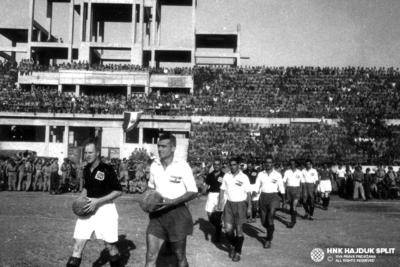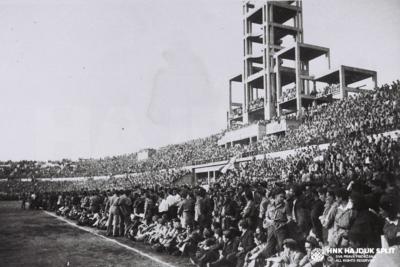Football club Hajduk in the People's Liberation Struggle
In May 1944, Split football club Hajduk was renewed on the island of Vis, a military base used by the Partisans and the Allies since the capitulation of Italy in the fall of the previous year. The leadership of the People’s Liberation Struggle, Frane Matošić writes, wanted the Partisan army of Yugoslavia to have its own team. And the 26th division was stationed on Vis; in its ranks, since the capitulation of Italy, there were many players from Hajduk and other Dalmatian clubs. Training and occasional matches with teams of other Allied armies on the island were simply added to their military tasks.
Hajduk played several matches on Vis during the spring, but the biggest football spectacle took place in September 1944 in the Italian city of Bari, an important Allied port in the second part of the war. It was a match between the military football teams of Yugoslavia and Great Britain. Just as Hajduk’s team was made of professionals, the British team featured several football stars gathered from the battlefield and from the rear units and led by Stanley Cullis.

This match was played at the Stadio della vittoria in front of 50,000 spectators. Most of them were soldiers brought to the stadium by about a thousand trucks from the battlefield, nearby garrisons, and hospitals. Jug Grizelj, a publicist and journalist, wrote: “Despite the doctor’s strict prohibition, together with other 26 wounded men, I escaped from the hospital bed and went to the match. In hospital pajamas, on crutches, with bandaged heads, arms, legs... and the Stadium was full like a pomegranate...” In addition, British Army Broadcasting Service transmitted the entire game over the radio for those who had to stay at the front lines.

Played in difficult wartime conditions – in the peninsula, Pietro Badoglio’s government sided with the Allies, but Mussolini and the reformed Republican Fascist Party with the considerable help of German troops still ruled in central and northern Italy – this match (as well as other similar events) was conceived not only as a motivating force for soldiers/fans of individual teams, but as an event that encouraged friendship and further cooperation between different nations united against a common enemy. Boosting and bolstering the same spirit of togetherness, the two teams played a rematch in the liberated Split in the very end of 1944.
Photographs: Reproduced with the permission of the Arhiv HNK Hajduk (Archives of the HNK Hajduk), Split, Croatia.
Sources:
Jurica Gizdić, “Sjećanje na Bari 1944” [“Memory of Bari 1944”], HNK Hajduk Split, September 23, 2014, https://hajduk.hr/vijest/sjecanje-na-bari-1944-/5017.
Robert Kučić, Vis 1944.-2014. Dani časti, ponosa i slave 70 godina poslije [Vis 1944-2014. Days of Honor, Pride, and Glory 70 Years Later]. Split: HNK Hajduk, 2014.
Frane Matošić, “Split kroz povijest” [“Split throughout History”], Facebook, April 13, 2020, www.facebook.com/groups/454694734543441/permalink/3227044213975132/.
